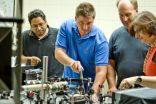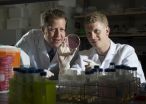In the last 20 years, the world has experienced unprecedented growth in global markets. Trading borders between countries have become more open. Supporters of globalization predicted large gains for developing economies, and in many ways, these predictions have come true. For example, China and India have seen a serious increase in GDP per capita precisely as a result of the growth of global markets. However, not everything has been so rosy. It was expected that globalization would also reduce the gap between the 'haves' and the 'have nots' in poor countries, which manifests itself in significant income inequality or, more precisely, in wages. In actual fact, however, this inequality has only increased. China and India are again vivid examples of this, writes Eric Maskin in his article 'Why Haven't Global Markets Reduced Inequality in Emerging Economies?', which has been published in The World Bank Economic Review.
Together with Michael Kremer, a colleague who is an economist and professor at Harvard University, Maskin developed an alternative theory that demonstrates why the difference in incomes is increasing in poor countries in proportion to the growth in globalization. They believe that the reason lies in a large gap in the level of education of highly skilled workers and low-skilled workers.
The theory of comparative advantage does not pan out According to the well-known theory of comparative advantage, trade between two countries brings benefits to both countries, even if one of them has an absolute advantage in the production of specific goods. Maskin notes that this theory, developed over two centuries ago, until recently was confirmed by the experience of all previous waves of globalization. If a poor country has more low-skilled labour, then it is more favourable, for example, to grow and export rice than to produce computer software, because the relevant specialists in that country are priced like gold. If a poor country still produces computer software, the difference in wages between programmers and agricultural workers is very high, and the production of software itself is not effective due to the lack of specialists. However, both countries need both rice and software. When trade barriers are removed, the poor country can concentrate on producing rice, which increases the demand for low-skilled workers and, consequently, reduces the demand for highly skilled workers. This is precisely the way in which globalization reduces inequality in poor countries. In contemporary conditions, this theory does not pan out. One of its premises is that the greater the difference in the level of skills in the labour force between two countries, the more these countries will trade with one another. However, Maskin notes that the globalization that is currently underway has led to a very small scale of trade between rich industrialized countries (e.g., the U.S.) and the poorest countries (e.g., Malawi). The predicted reduction in inequality has not taken place.
Education reduces inequality Maskin and Kremer have developed an alternative theory that actually shows what happens with income inequality during the process of globalization. First, they note that the current globalization differs from all previous eras of internationalization of the production process. For example, computers are now often designed in the United States, programmed in Europe and assembled in China. At the same time, a Chinese worker can be hired by a company located on another continent. The labour market has become truly global, says Maskin. However, in this new global market specific processes are taking place. To demonstrate them, Maskin identifies four levels of professional development - A and B for rich countries, and C and D - for poor countries. In the model developed by Kramer and Maskin, the level of wages depends on how specialists with different qualifications cooperate with one another to obtain the production result. The production process involves two challenges: administrative and performance. The result is achieved through a manager's cooperation with a subordinate, and the quality depends on these professionals' level of qualification. Successful cooperation therefore contributes to greater productivity and influences the level of wages for specialists. However, in this case, the issue concerns the period before globalization when A specialists cooperate with B specialists in rich countries and, respectively, C specialists cooperate with D specialists in poor countries. After globalization, the following happens: D specialists from poor countries lack the qualifications to cooperate with A and B specialists in rich countries. Moreover, if C workers from poor countries see their wages increase due to cooperation with B workers from rich countries, D workers either do not feel the growth or their wages decrease. The overall effect is that the internationalization of production will increase the wage gap between the two categories of professionals in poor countries and, consequently, increase the level of inequality. According to Maskin, the solution is to raise the level of education of low-skilled workers. However, he notes that workers themselves do not have the resources for this, and that it is not beneficial for companies to pay for their education. In this situation, a significant role can be played by governments, international agencies, NGOs and private foundations, says Maskin. He notes that the theory he has developed is in no way a call for the process of globalization to be stopped, as it has borne and continues to bear fruit in the form of GDP growth. However, Maskin argues that the most effective way to combat inequality is to give low-skilled workers the opportunity to enjoy the fruits of globalization as well. 'Kremer and Maskin have offered a surprisingly beautiful model, an alternative Ricardian theory of comparative advantage', said Fuad Aleskerov, Tenured Professor and Head of the HSE International Laboratory of Decision Choice and Analysis. 'It helps explain why globalization has led to inequality in income. And like any powerful theory, I am certain that it will lead to a surge of empirical work in this area'. Aleskerov recommends that first-year undergraduate students read this short text. 'It brilliantly explains how mathematical models can describe the fundamental processes of the economy'.
INFORMATION:
See also:
Demand for 'white collar professionals' has transformed the labour market (in Russian)
Uncertain employment is transforming society (in Russian)
The working class more vulnerable to poverty
Higher education halves the risk of poverty
Social stratification is reproduced in education



